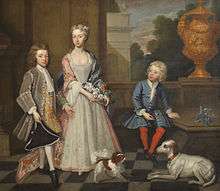Charles Ambler (barrister)

Charles Ambler (1721 – 28 February 1794) was an English barrister and politician, the second son of Humphry Ambler (~1681–1745) barrister of Stubbings Park Maidenhead[1] and Bream's Buildings Chancery Lane, and his wife Ann, daughter of Charles Bream (~1662–1713) timber merchant of Bridewell and Bream's Buildings. Charles's crippled (by a fall when aged eight) epileptic elder brother, Humphry, died of a consumption unmarried in 1752. The Ambler mansionhouse at Stubbings was built by Humphry Ambler on the site of a small portion of forest acquired with his stepfather Richard Bassett of White Waltham and harvested for shipbuilders.[2]
Family
Charles Ambler married Ann Paxton[1] (1719–1789) second daughter of Nicholas Paxton, solicitor to the treasury under Walpole, 10 May 1746 in the chapel at Somerset House in a nonconformist service, the Ambler family having strong presbyterian connections. Ann and Charles Ambler lived at 3 Queen Square and at Stubbings House. No children survived them, two sons died as schoolboys at Harrow. A small part of her family correspondence is preserved in the Special Collections Department of the University of Birmingham.[3]
He died on 28 February 1794 at his house Stubbings near Maidenhead and was buried nearby at Bisham beside his wife. He was for many years Steward and keeper of the royal manors of Cookham and Bray succeeding his father. His estate was inherited[4] by his sister's son,[5] Elisha Biscoe (1753–1829), who at first leased Stubbings to Lord Dorchester then sold it to him shortly before Dorchester's death in 1808.[6] Biscoe also sold his own father's house at Spring Grove to Sir Joseph Banks in 1808 after Banks had leased it almost 30 years. Biscoe then built Holton Park in Oxfordshire now Wheatley Park School.
Career at the bar
Charles Ambler was educated at Eton from 1732 and admitted to the Middle Temple 29 July 1736. He was called to the bar in 1742. Entered at Lincoln's Inn 26 July 1757 he was made a bencher in 1758 and King's Counsel 6 May 1761.[7]
House of Commons
In 1769 Ambler and Thoroton were put forward by Lord Granby for the Bramber constituency and though defeated they were returned on petition. He did not stand at the following election but in 1775 he was returned for Newtown and provided steady support to North acquiring the name "Tully Ambler, an ironical title which he does not owe to his abilities".[1]
From 1780 he served the Newcastle interest for Saltash, Devon until 1790 when he did not stand again.[1]
Political appointments
He succeeded his wife's kin Sir William Blackstone as solicitor-general to Queen Charlotte 1771–1782 and then her attorney-general 1782–1794
Law reports
In 1790 he published Reports on Cases in Chancery, 1737–83. A revised edition published by Blunt in 1828 has been said to have removed some defects.[1]
References
- 1 2 3 4 5 Mary M. Drummond The History of Parliament 1754–1790, 1964, The History of Parliament Trust
- ↑ Will of Humphry Ambler of Bisham, Berkshire, 4 November 1745, PCC Wills, PROB 11/742
- ↑ University of Birmingham Information Services, Special Collections Department, Main Library, Edgbaston Campus. MS206 2005/53
- ↑ Will of Charles Ambler of Stubbings, Berkshire,14 March 1794, PCC Wills, PROB 11/1242
- ↑ Daniel Lysons The Environs of London: volume 3: County of Middlesex (1795), footnote 44, p.45.
- ↑ P.H. Ditchfield and William Page (eds), Bisham, A History of the County of Berkshire: Volume 3 1923, Victoria County History
- ↑ Hutchinson, John A catalogue of notable Middle Templars, with brief biographical notices 1902 London, Butterworth, page 3
External links
- portrait of Mrs Humphry Ambler (d. 1722), mother of Charles, by Kneller
- portrait of Humphry Ambler (1681–1745) of Stubbings Park attrib. Knapton
| Parliament of Great Britain | ||
|---|---|---|
| Preceded by The Lord Winterton Charles Lowndes |
Member of Parliament for Bramber Sussex 1769–1774 With: Thomas Thoroton |
Succeeded by Sir Henry Gough Thomas Thoroton |
| Preceded by Harcourt Powell Sir John Barrington |
Member of Parliament for Newtown Isle of Wight 1775–1780 With: Sir John Barrington 1775-1775 Edward Meux Worsley 1775–1780 |
Succeeded by Sir John Barrington Edward Meux Worsley |
| Preceded by Colonel William Phillips Anthony Eyre |
Member of Parliament for Boroughbridge 1780–1784 With: Anthony Eyre |
Succeeded by The Viscount Palmerston Sir Richard Sutton, Bt |
| Preceded by Grey Cooper Henry Strachey |
Member of Parliament for Saltash 1784–1790 With: Charles Jenkinson 1784–1786 The Earl of Mornington 1786–1787 John Lemon 1787–1790 |
Succeeded by Edward Bearcroft Viscount Garlies |